Computing & IS
Four Awarded during EASLIS@60 Celebrations: DGRT calls on information scientists to empower research hubs & entities
Published
2 years agoon
By
Jane Anyango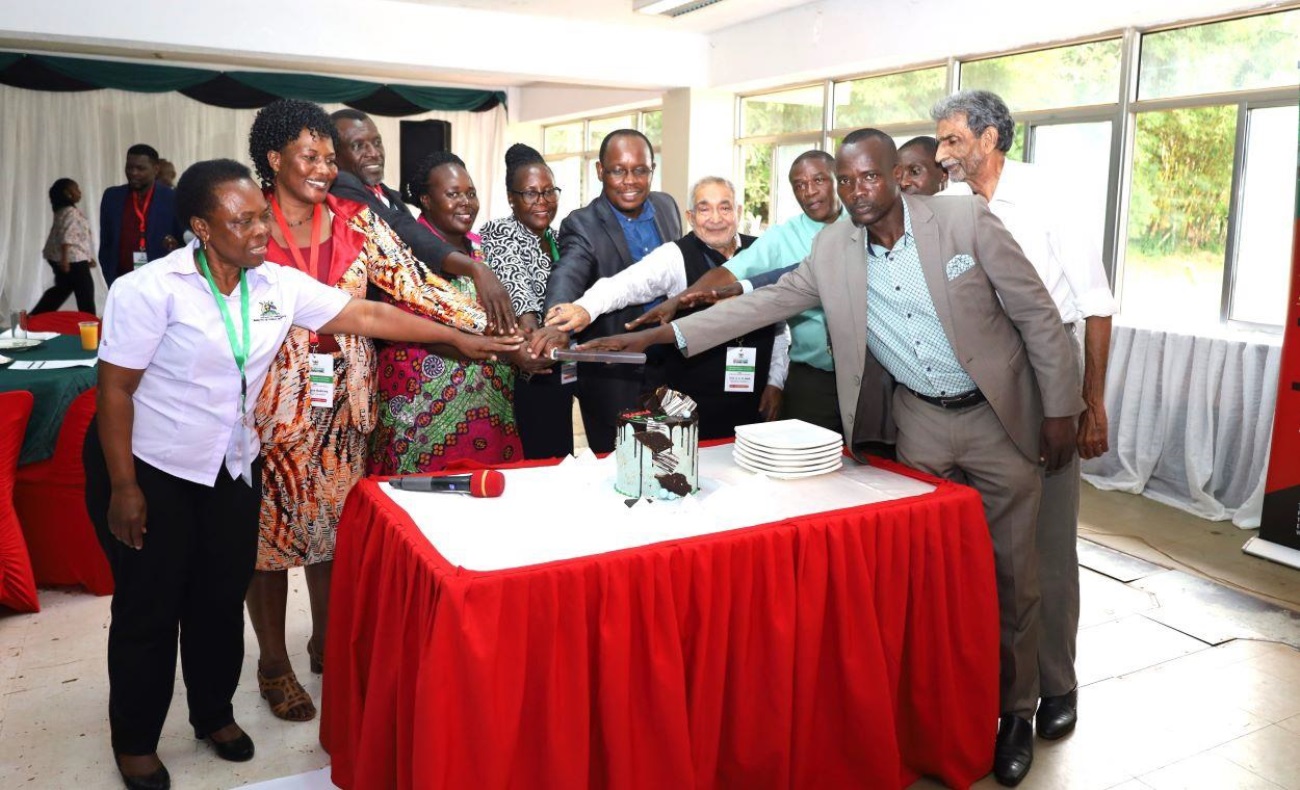
The three –day celebrations to mark the 60 years of the East African School of Library and Information Sciences (EASLIS@60) service to humanity were crowned by a Luncheon on Friday 10th November, 2023.
The closing ceremony was graced by the Director, Directorate of Research and Graduate Training (DRGT), Prof. Edward Bbaale as Chief Guest. Prof. Bbaale implored information scientists to contribute to the development of research and innovation hub at Makerere University and also embrace digital technologies in management of information and data.
Describing the event as a testament to Makerere University‘s unwavering commitment to academic excellence, research and the nurturing of intellectual talent, Bbaale said, library and information sciences play a pivotal role in any university, serving as a cornerstone for teaching, research, and innovation.
He explained that Makerere University activities are guided by the Strategic Plan for 2020-2030, which is a visionary roadmap that aims to transform Makerere into research-led and innovation-driven institution. This vision according to the Director, rests upon three fundamental building blocks, each playing a crucial role in the transformative journey.
The first building block emphasizes a distinct shift towards increased graduate enrollment, particularly at the doctoral and postdoctoral levels. The goal according to Prof. Bbaale is to raise the share of graduate students. Presently the graduate student population stands at around 12% with only 2% being international students.
“As the school celebrates 60 years, it is time to rethink vividly raising graduate enrolment because you hold a key role in trying to raise a generation of people that can be sources of information and data and guidance to national transformation,” Bbaale appealed.
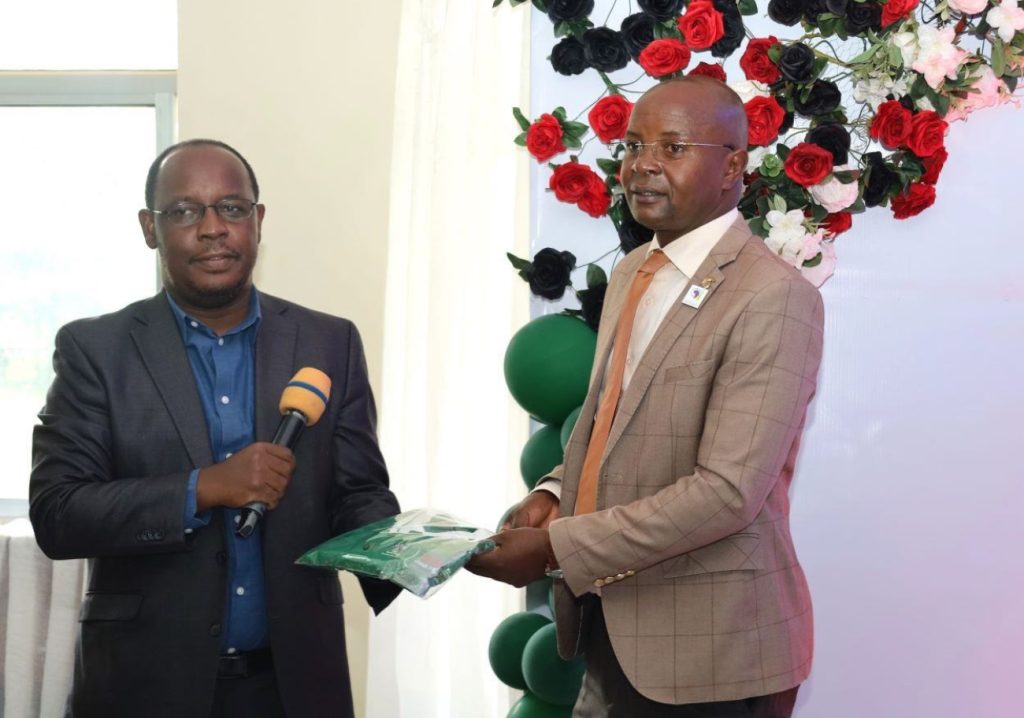
The second building block according to the Director focuses on building research entities designed to catalyze large-scale, multidisciplinary, and multi-institutional research activities. Supported by the policy on the establishment of research entities and institutions of 2021, these entities are envisioned as hubs of innovation, fostering collaboration that transcends boundaries.
“You are the source of information. These research centers will not thrive without you. And we are very happy that you have trained many people and the many libraries are benefiting from you. We can also look at this scenario where you can work to empower research hubs that we have. You have a responsibility to help these research hubs come up because the university is saying, we don’t have any other way we shall be research intensive, we don’t have any other way, we shall be innovation-driven until when we have established large research entities, centers of excellence’ He said.
The third building block underscores the importance of packaging and marketing research outputs for effective adoption and adaptation to impact communities. Initiatives like the Makerere UNDP Innovation Hub aligns with this vision and this is supported by policies like the intellectual property management policy and the research and innovations policy of Makerere University.
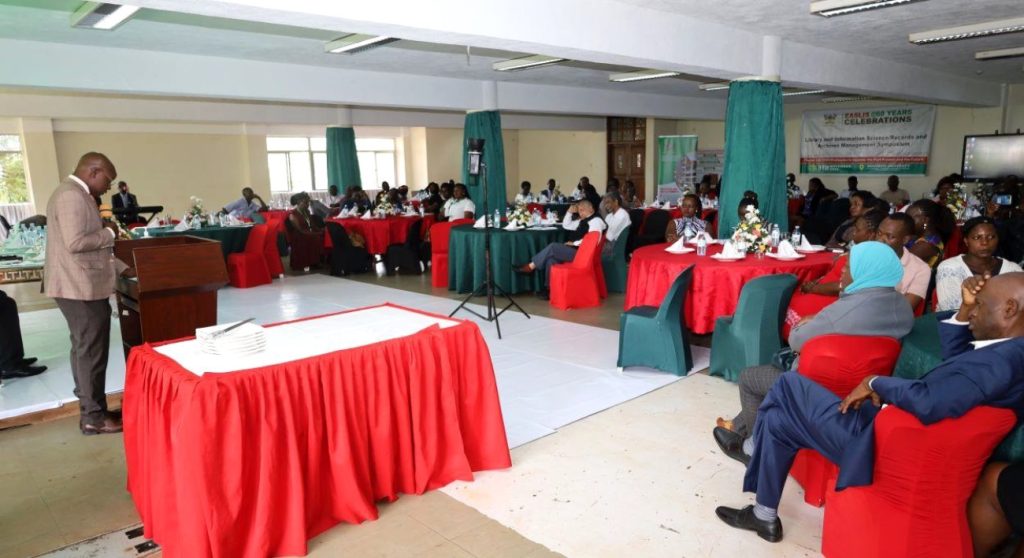
“The East African School must work collaboratively with the innovation hub. What are those aspects about innovation that must be developed through training? Because later on, the graduates that you are going to churn out must be able to support innovators through providing the requisite information that is needed”, The Director asserted.
Prof. Bbaale congratulated the school upon its milestones and challenged experts to move with the university aspirations on grounds that library and information science field, focusses on the interactions between people, information, and digital technologies which plays a vital role in enhancing information creation, access, management, sharing, and societal benefit.
As the Directorate of Research and Graduate Training, Prof. Bbaale said they acknowledge the strong complementarity working relation between the DGRT mandate and the expertise of the EASLIS in terms of dealing with the student information, creating repositories and making sure that information is available and usable very quickly when we need it.
Representing the Principal CoCIS, the Deputy Principal Dr. Peter Nabende expressed happiness that EASLIS which started in 1963 as an agreement between the then three countries in East Africa, Kenya, Tanzania and Uganda has survived throughout the years.
“It has, not only survived, but achieved greatly in many ways. It continues to uphold excellence in all aspects. From my observations, the levels of professionalism at EASLIS, the levels of commitment, they are the kinds of levels I have never seen anywhere else”. Dr. Nabende stated.
Nabende explained that the school has contributed significantly in terms of research and practice and preservation of records, serving as the main center of excellence in library and information sciences, and in addition continued to establish partnerships with highly reputable institutions worldwide.
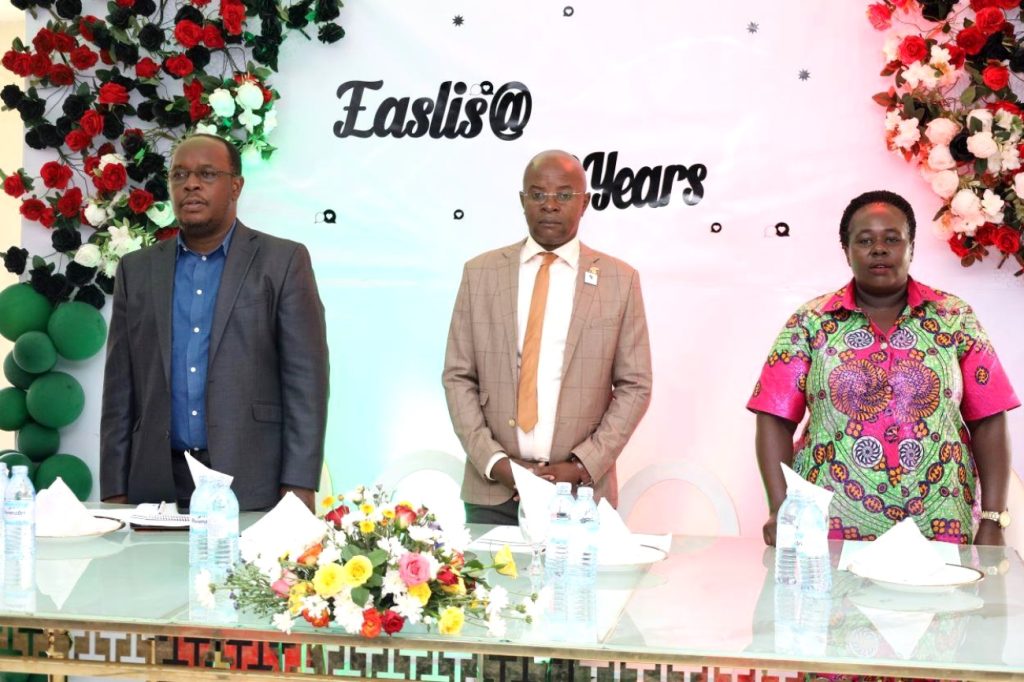
Dr. Nabende observed that the school finds itself at a time when the world is advancing technologically but it is advancing in a sense that what is driving the advancement is information.
He called for more concerted efforts to remain the center of reference, through adopting new technologies in information and data management.
He attributed the success of the celebrations to the support from different stakeholders including university top management and the principal’s office for providing most of the funds, contributions from the collaborating institutions and all individuals that played various roles.
The Dean, EASLIS Dr. Sarah Kaddu said the event was to commemorate the relentless pursuit of knowledge, the unwavering commitment to excellence and the profound impact EASLIS has had on society and on to peoples’ lives.
She explained that the three day celebrations characterized by intellectual quiz and talk shows, the symposium and crowned with a luncheon, widened participants aperture, created a platform to meet new people to encounter new ideas and experiences.
The Dean said, the roots of EASLIS trace back to a vision of empowering communities through access to information, preserving knowledge, and nurturing an environment where the pursuit of learners knows no bounds.
“Our school’s legacy extends far beyond the confines of its physical structure. It embodies the spirit of dedication, innovation, and adaptability, among others. Libraries are not mere buildings stocked with books. They are sanctuaries of learning and inspiration, serving as bridges between the past, present and the future.
Information science as a discipline has evolved dramatically, translating boundaries and revolutionizing how we access, organize and disseminate information. Our institution has been at the front line of these changes, adapting and leading the transformations,” Dean noted.
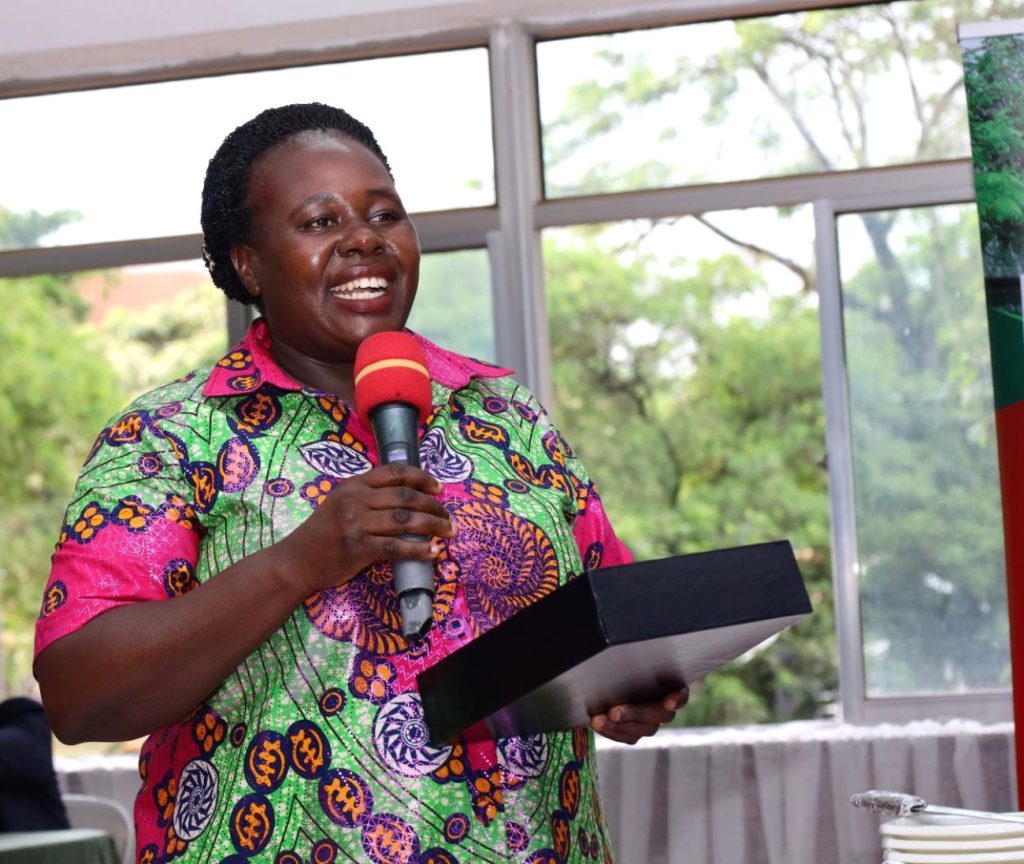
Dr. Kaddu recognized the pivotal role played by the individuals who have been the driving force behind the school’s success. Kaddu recognized faculty members whose passion for scholarship and commitment to nurturing the minds of the next generation of professionals has been exemplary adding that the school has always been a beacon of academic rigor and integrity.
“I have noticed many changes over the years. Our commitment to excellence and nurturing of intellectual curiosity has remained unwavering. This anniversary is not just a testimony to the enduring dedication of everyone associated with this institution, but also a celebration of our collective achievements.” The Dean asserted.
The school she said, has witnessed the rise and disruption of technology as a catalyst, reshaping the landscape of information science.
“Our libraries have transcended physical boundaries, extending into the digital realm. We’ve embraced these changes, fostering innovation and diversifying our programs to meet the demands of the modern era while upholding the fundamental principles that underscore our profession.
Furthermore, our collaborations and partnerships with other institutions, organizations, and communities have not only enriched our education environment, but have also empowered us to make a broader and more meaningful impact on the communities we serve”, Dr. Kaddu assured.
Looking towards the future, Dr. Kaddu said, the school is poised at an exciting juncture with a horizon of possibilities they must continue building on. As the school embarks on the next phase, the Dean called upon faculty and alumni to remain adaptable, resilient, embracing change, while staying rooted in the values and principles that have been the bedrock of this school for six remarkable decades.
Dr. Kaddu expressed gratitude to all who have contributed to the success of this institution and the celebrations.
Four recognized for their outstanding service to EASLIS
The closing ceremony was also marked by awards of four distinguished personnel who have served the school in different capacities.
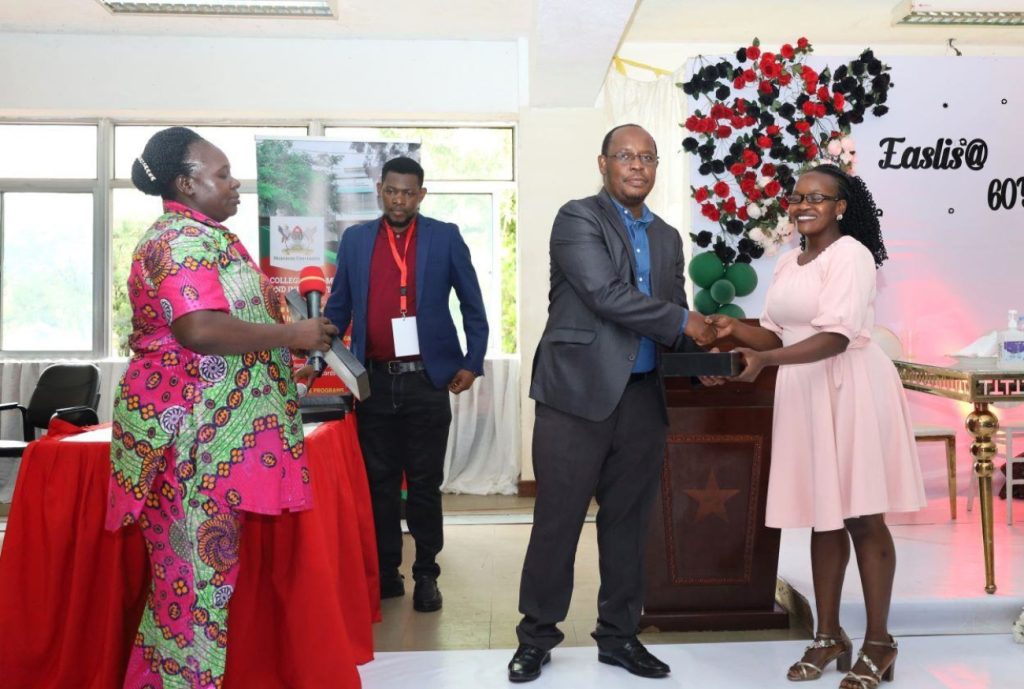
The Rising Star Award was presented to Mr. Geoffrey Magimbi in recognition of his outstanding academic resilience and success. Magimbi, joined the school as a custodian without any academic paper. Being in the academic circle, he was inspired and determined to enrol for a certificate course , then a diploma, to a bachelors and now pursuing Masters. He has also served in the Ministry of Public service and currently working with the Mountains of the Moon University.
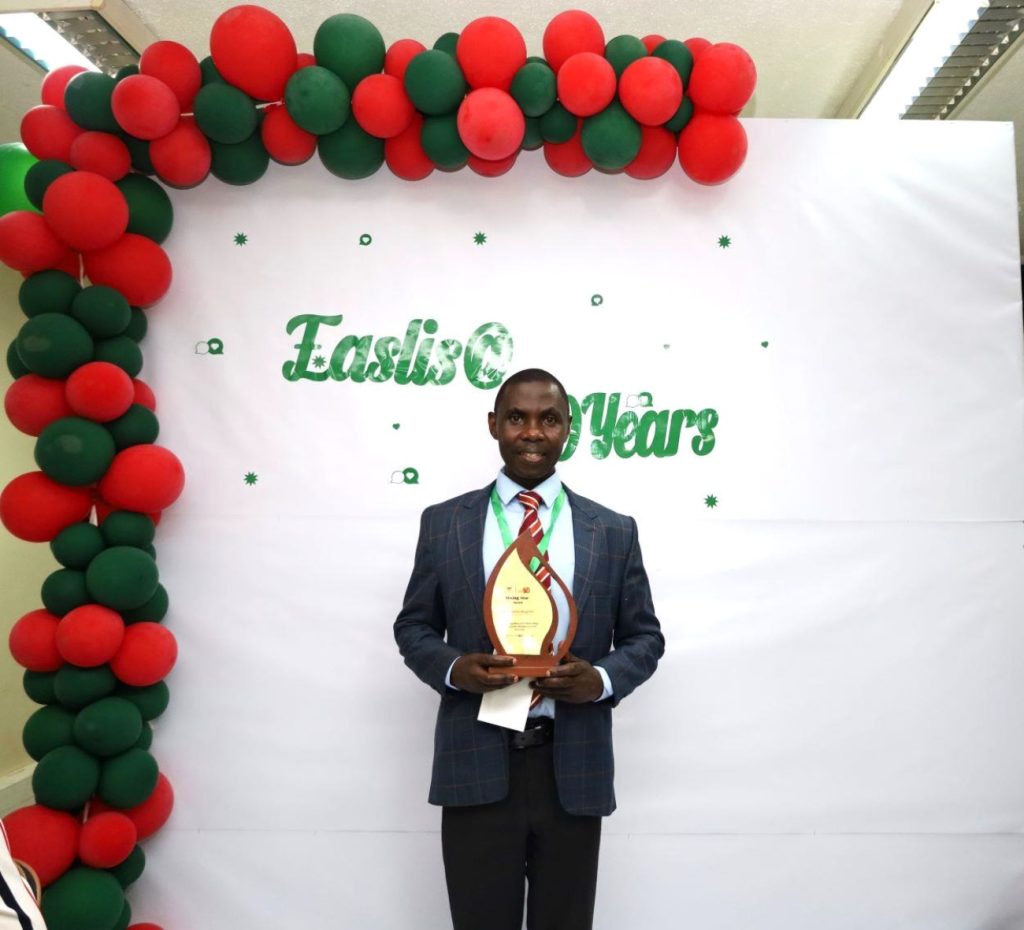
The Leadership Award was presented to Prof. S. AH. Abidi in honor of his long and exemplary service as Director EASLIS (1972-2002). Another Leadership Award was presented to Ms. Sarah Kagingo in absentia, in appreciation of her loyalty and dedicated service as the first Guild President from EASLIS (1997-1998).
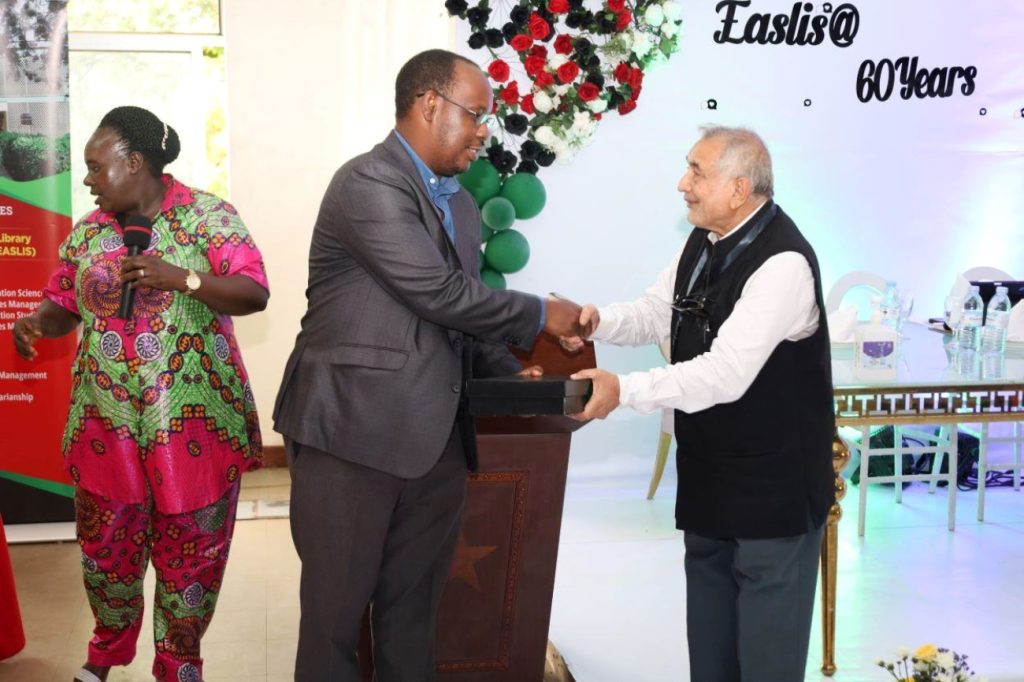
The Service award was presented to Boniface Odongo with deepest appreciation for his outstanding contribution as the longest serving librarian from 1996-2012 . Odongo who was unwell, was represented by his daughter Aguttu.
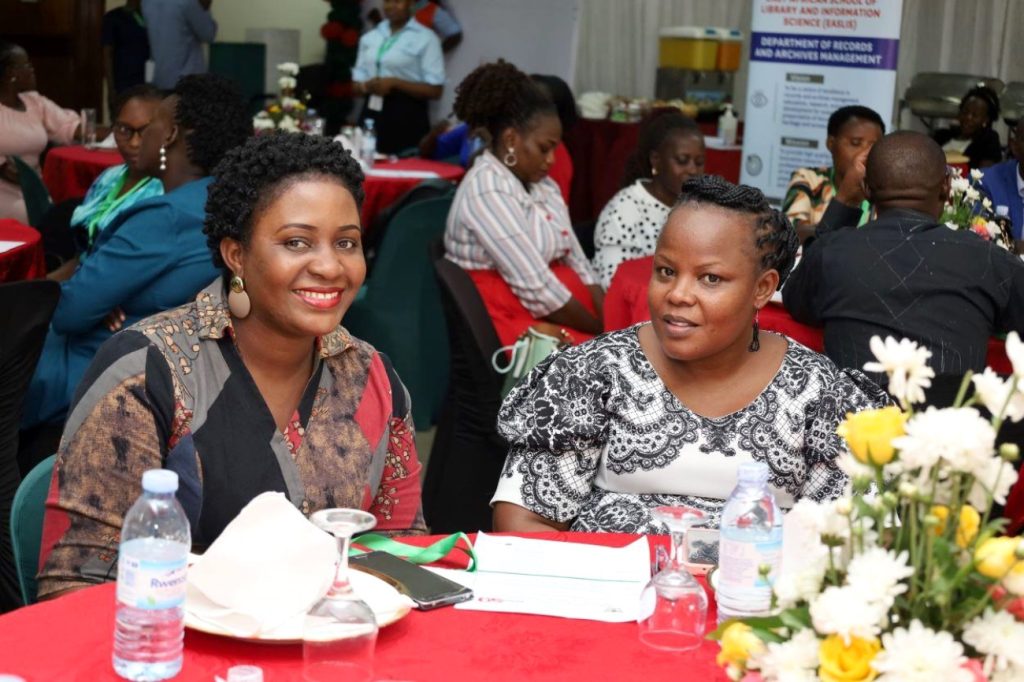
You may like
-


CAES Presents Overall Best Performing Student in the Sciences & a Record 28 PhDs at the 76th Graduation Ceremony
-


Graduation marks the next phase of accountability, graduates told
-


Over 9,200 to graduate at Makerere University’s 76th Graduation
-


76th Graduation Highlights
-
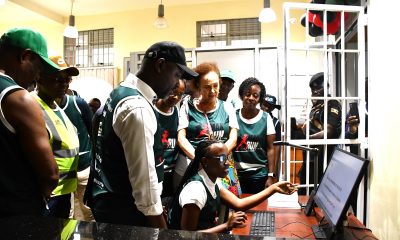

Students empowered to thrive through the Semester
-


Strengthening Global Partnerships to Advance Research, Innovation, and Graduate Training: Makerere University Hosts Delegation from the University of Warwick
Computing & IS
Makerere Launches Scholarly Guide, Calls for Increased Research, Publication and Innovation in Africa
Published
2 weeks agoon
February 12, 2026By
Jane Anyango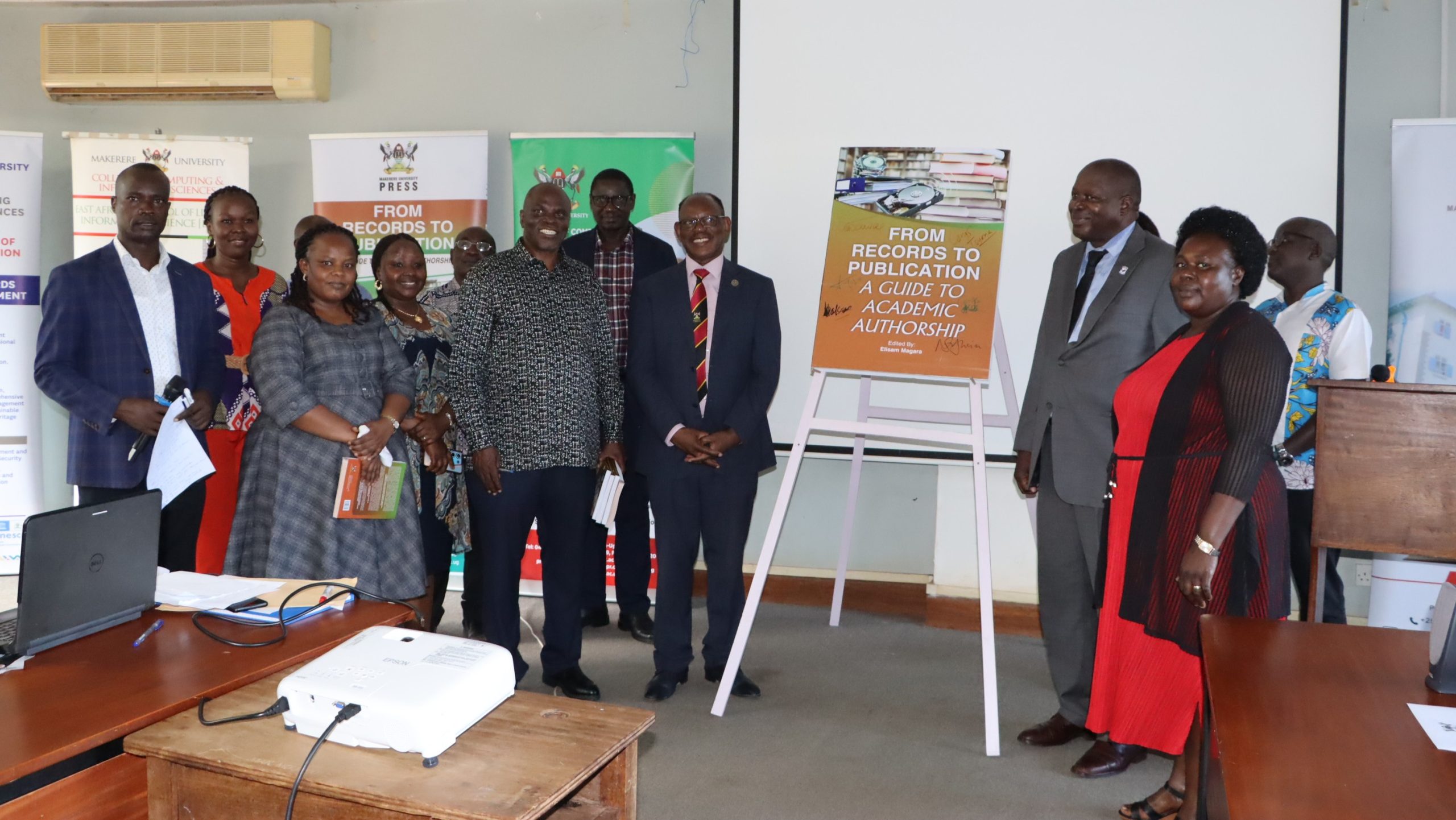
VC Emphasizes Research as Key to Africa’s Global Integration
Makerere University Vice Chancellor, Prof. Barnabas Nawangwe, has urged universities across Africa to invest in research, publication, and innovation as a pathway to greater participation in the global knowledge economy.
Speaking at the launch of From Records to Publication: A Guide to Academic Authorship, edited by Prof. Elisam Magara of the East African School of Library and Information Sciences, Prof. Nawangwe highlighted Africa’s low contribution to global scholarship. “Although Africa accounts for 15 percent of the world’s population, it produces only 3 percent of global research publications,” he said.
“There are historical reasons for this,” the Vice Chancellor continued, referencing centuries of slavery and colonialism. “You cannot brush away 600 years of subjugation. And we Africans have not even written enough about that. If we want to move Africa back into the global community, we must invest in research, publication, and innovation.”
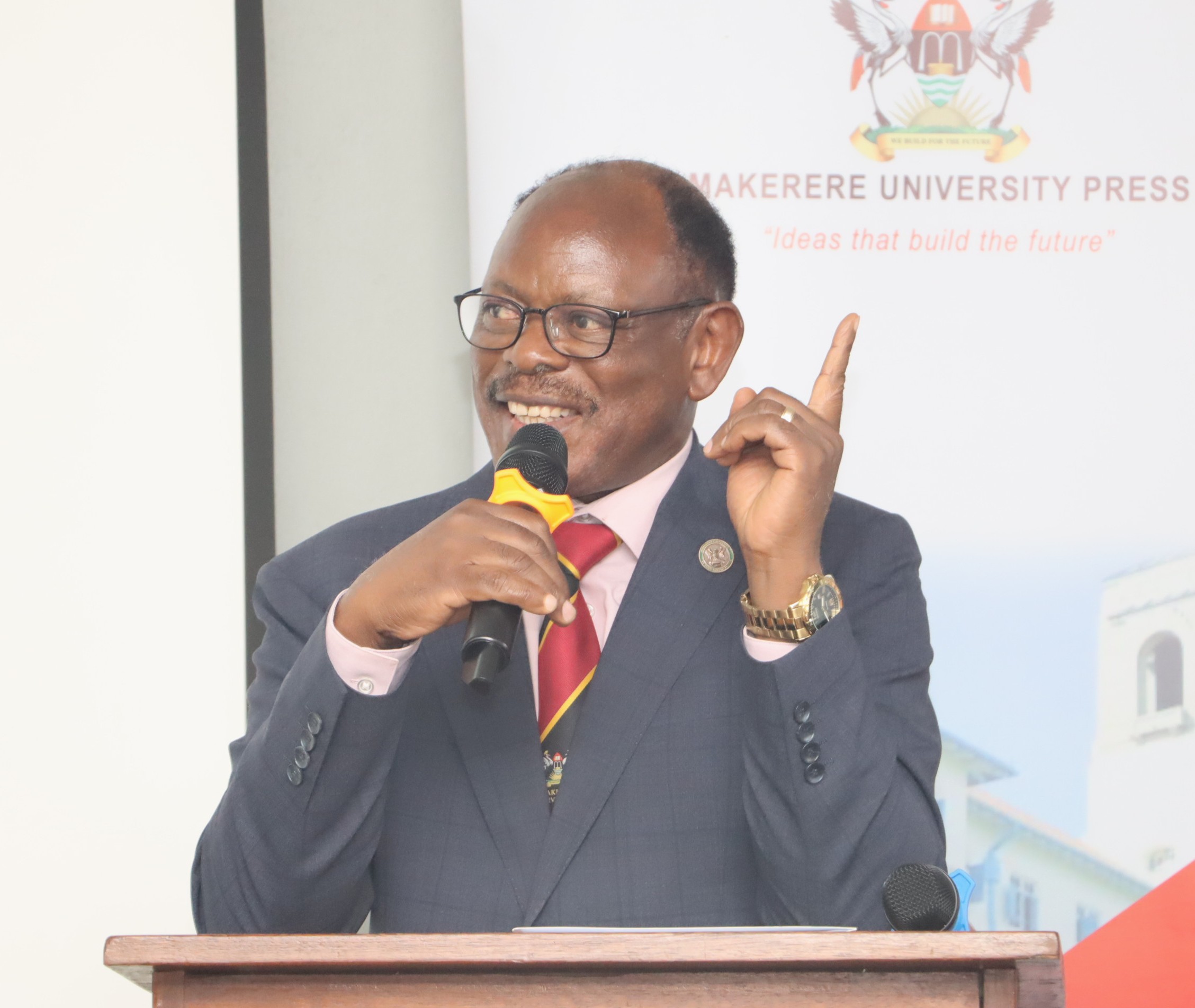
He cited China as an example, noting how the country’s investment in research and education has translated into economic and global influence. “When we say China is the factor of the world, it is not that people just wake up and begin making things. They invest in education, in publication, in research. If we want to transform Africa, we must do the same.”
Prof. Nawangwe highlighted Makerere’s progress, revealing that annual peer-reviewed publications have grown from about 500 a decade ago, to 700, and now exceed 2,000. He acknowledged that the university still trails South African institutions, partly because they operate numerous local journals that absorb significant volumes of research. “We are not fully utilising the brand of Makerere University Press,” he said, pledging support to strengthen the press and scale up journal production.
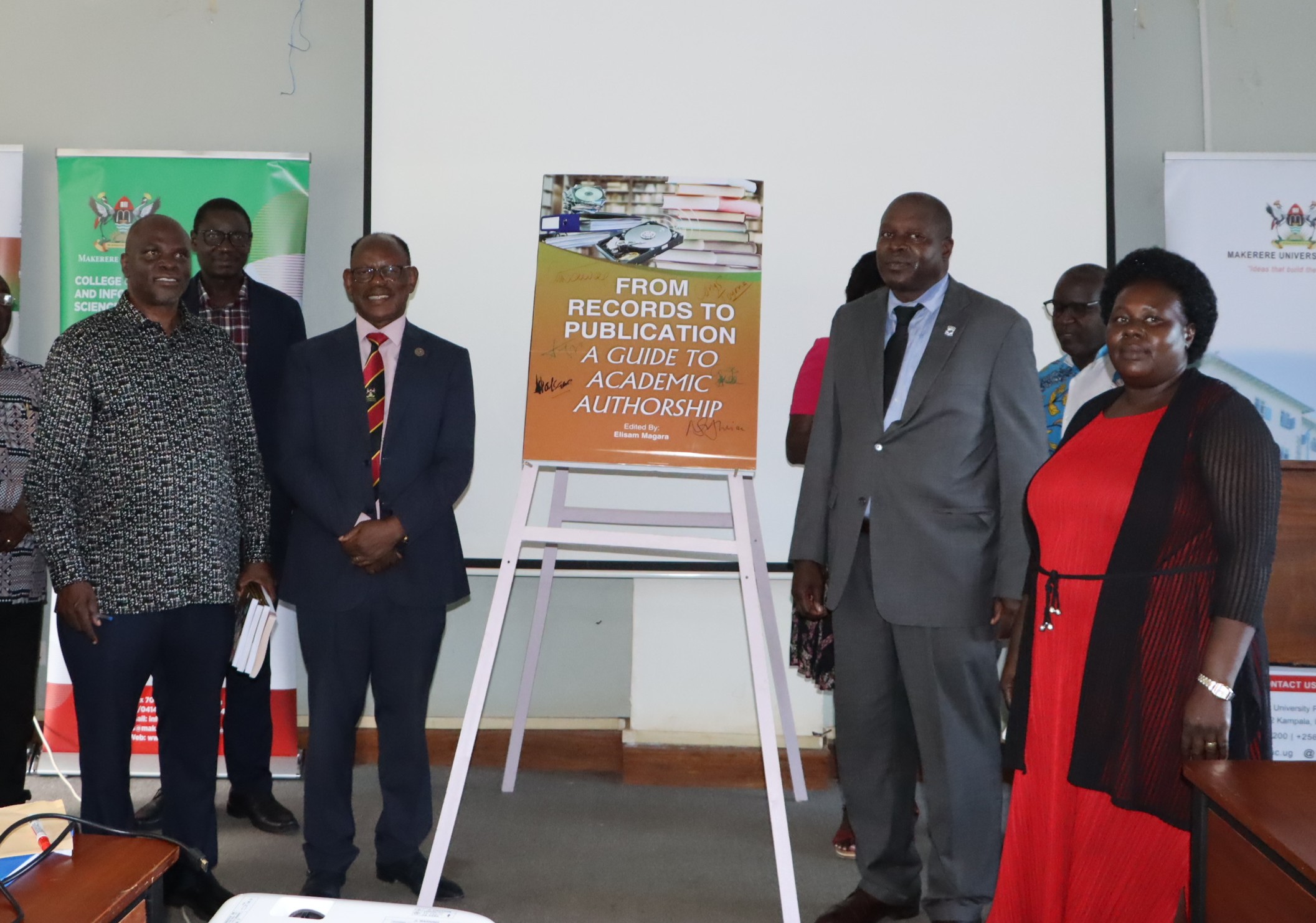
He also reaffirmed the university’s strategy to reduce excessive undergraduate enrolment and expand graduate training to boost research output. “Let us create time for professors to do research and supervise more graduate students,” he said.
Commending Professor Magara and his team for producing the authorship guide, Prof. Nawangwe described the book as an essential handbook for Master’s and PhD students, early-career researchers, and universities across the region striving to become research-led. “This is at the heart of the university. If we invest in research and publication, we secure our future,” he said.
Book Recommended as Mandatory Guide by College Principal
Makerere University’s Principal of the College of Computing and Information Sciences, Prof. Tonny Oyana, called for the newly launched volume to be adopted as a mandatory guide for graduate students and newly appointed lecturers. “This is not a bad book for our first-year PhD students to start with,” he said. “Even those who are hired as junior lecturers still need mentorship. If I were the Vice Chancellor, I would put this book as required reading for every new hire.”
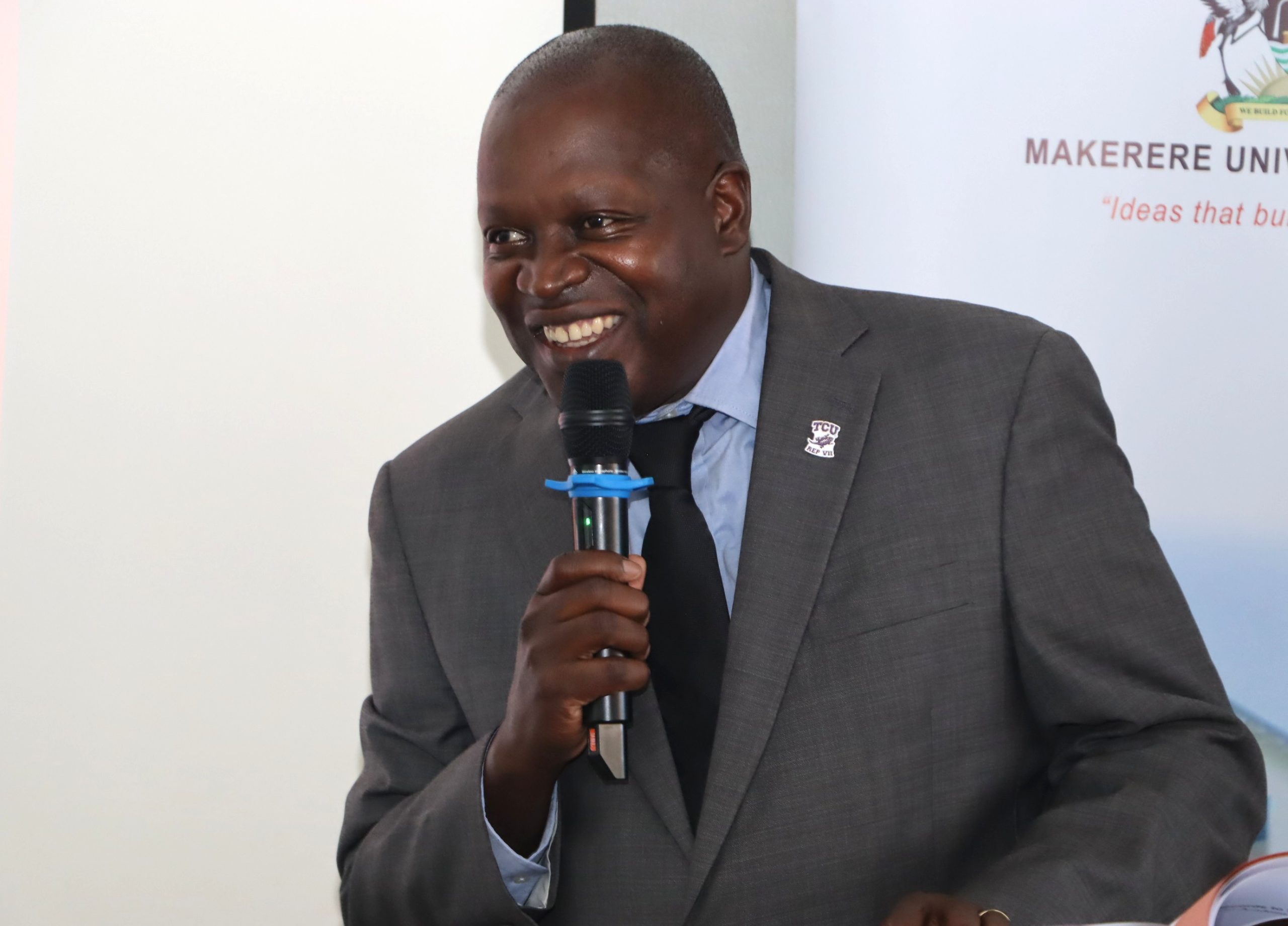
Prof. Oyana reflected on his personal contribution to the book, revealing that administrative responsibilities nearly forced him to withdraw. “Because of the work that I do, I was about to give up,” he admitted. “But Professor Magara was persistent. He came back to me and gave me more time.”
He credited a PhD student, Caroline Ilako, for assisting with library research and literature reviews, saying, “She did a wonderful job. We went back and forth through revisions, but finally we produced the work.”
On the quality of the book, Prof. Oyana said, “When you pick up a book, look at how it is laid out. The quick judgment tells you about the quality. This is well put together. We are beginning to show quality comparable to Western presses.”
He also challenged traditional notions of “publish or perish,” noting, “As scholarship evolves, those who evaluate scholarship must also adjust. Impact, innovation, and tangible products are increasingly valued alongside journal articles.”
Editor Highlights Research-Based Approach
Prof. Elisam Magara, the book’s editor, explained that the guide is designed to support scholars from the moment they conceive a research idea to the point their work is published and read. “I looked at the books we were using and asked myself: which kind of book can truly guide students? We needed a clear guide from the time a scholar thinks of writing up to the time the book is read,” he said.
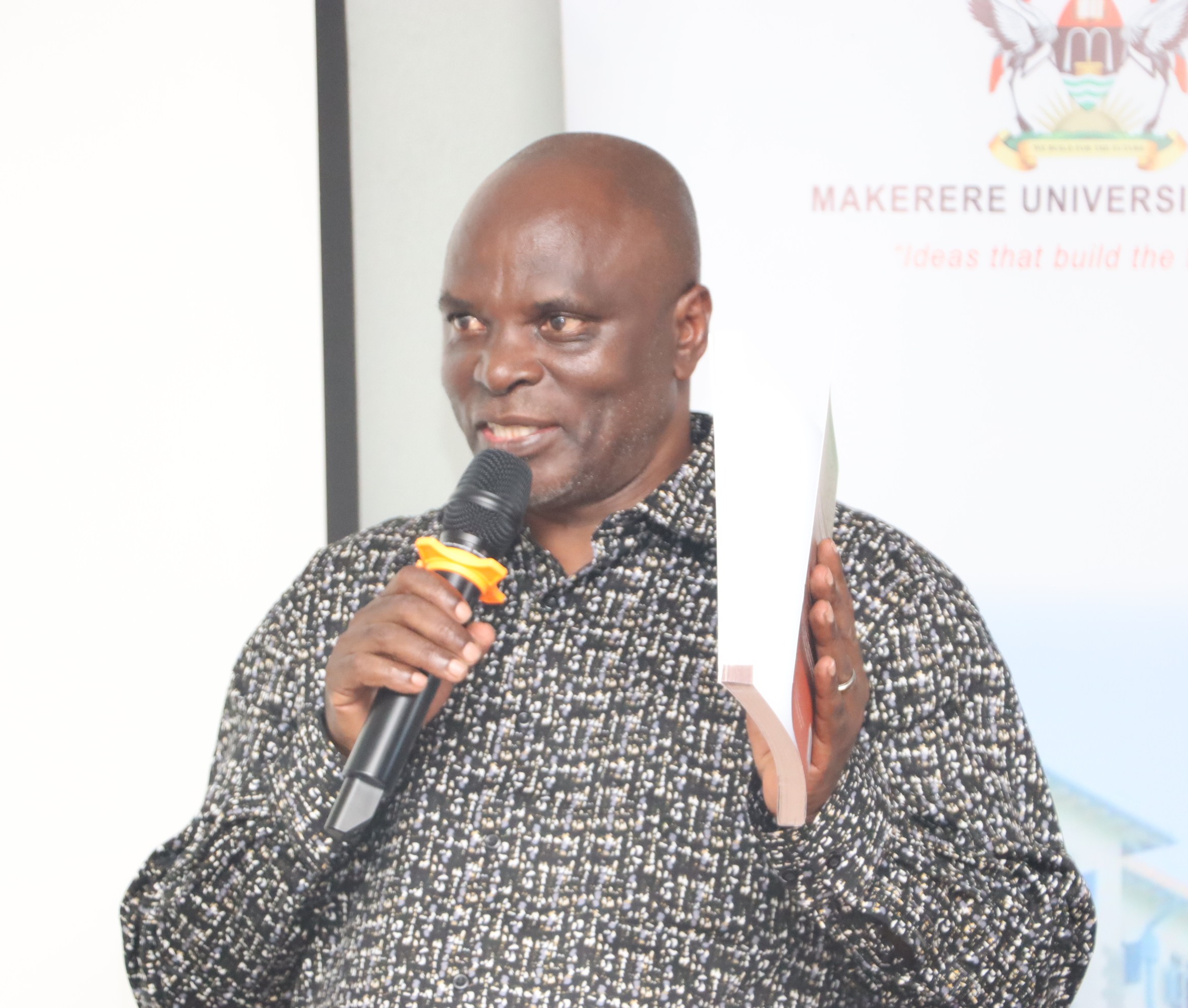
He detailed the rigorous editorial process that began in 2022, including international calls for contributions, peer review of abstracts, writeshops for feedback, and multiple rounds of chapter reviews. “Don’t write and keep,” he advised. “Your book must have impact. It must reach the public and be used.”
Prof. Magara also acknowledged the sabbatical granted by the Vice-Chancellor, which enabled him to balance teaching and editorial responsibilities. “This book is meant not just for Makerere but for scholars across the region and beyond,” he said.
Mak Press Outlines Rigorous Publishing Process
Dr. Isaac Tibasima, representing the Managing Director of Makerere University Press, explained the publication pathway. “Once you bring your manuscript to the press, we take it through evaluation, external peer review, revisions, copy-editing, typesetting, and pre-press review before printing,” he said.
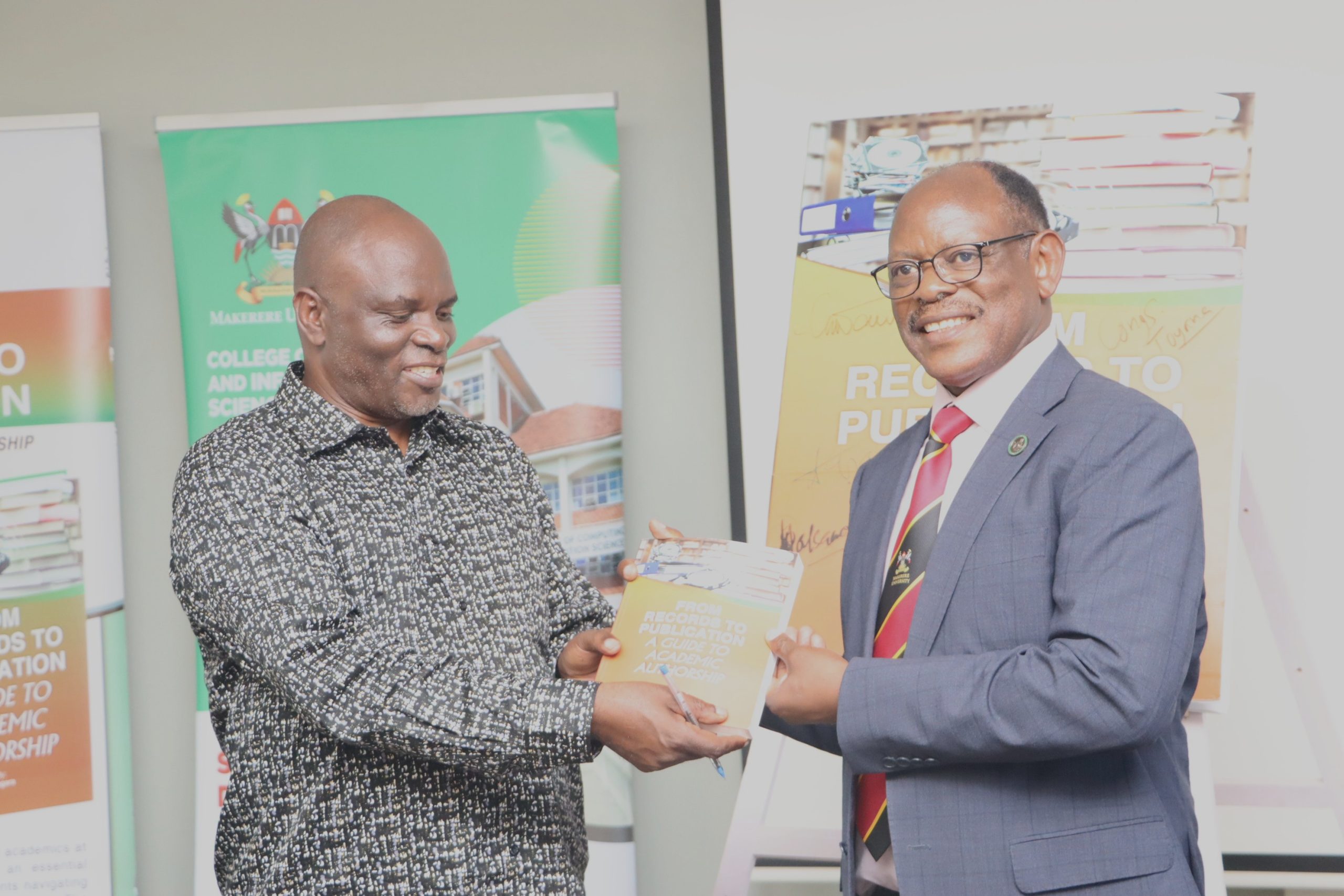
He also highlighted the press’s efforts to strengthen college-based journals. “We will not run the journals, but they will be published under the imprint of Makerere University. If we produce consistent issues, we can then move toward global indexing,” Dr. Tibasima said.
All new journals and articles now carry Digital Object Identifiers (DOIs) to enhance discoverability, while past publications are being retroactively assigned DOIs. “We are not there yet, but we are moving there, and we are intentional about getting there,” he added.
School Leaders Celebrate Scholarship and Mentorship
In welcome remarks, Dr. Sarah Kaddu, Dean of the School, said, “This event is a celebration of scholarship, intellectual discipline, and the journey of knowledge creation. This book speaks directly to one of the most critical challenges facing scholars—transforming research records into publishable work.”
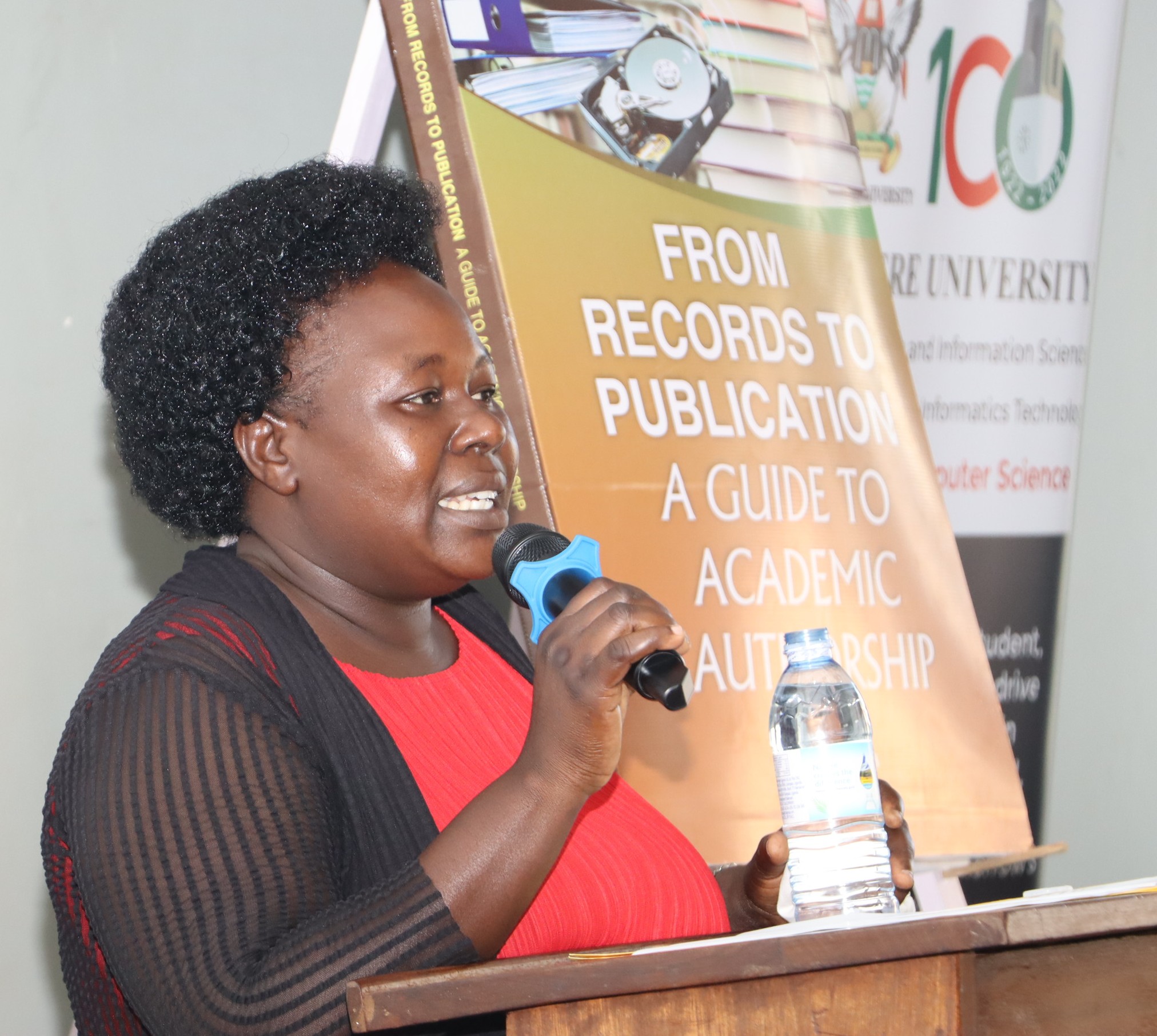
Dr. Sylvia Namujuzi, Head of the Department of Records and Archives Management, added, “This book is timely. It responds to real challenges faced by early-career researchers, postgraduate students, and even seasoned academics—questions of structure, authorship ethics, citation, collaboration, and navigating the publication ecosystem.”
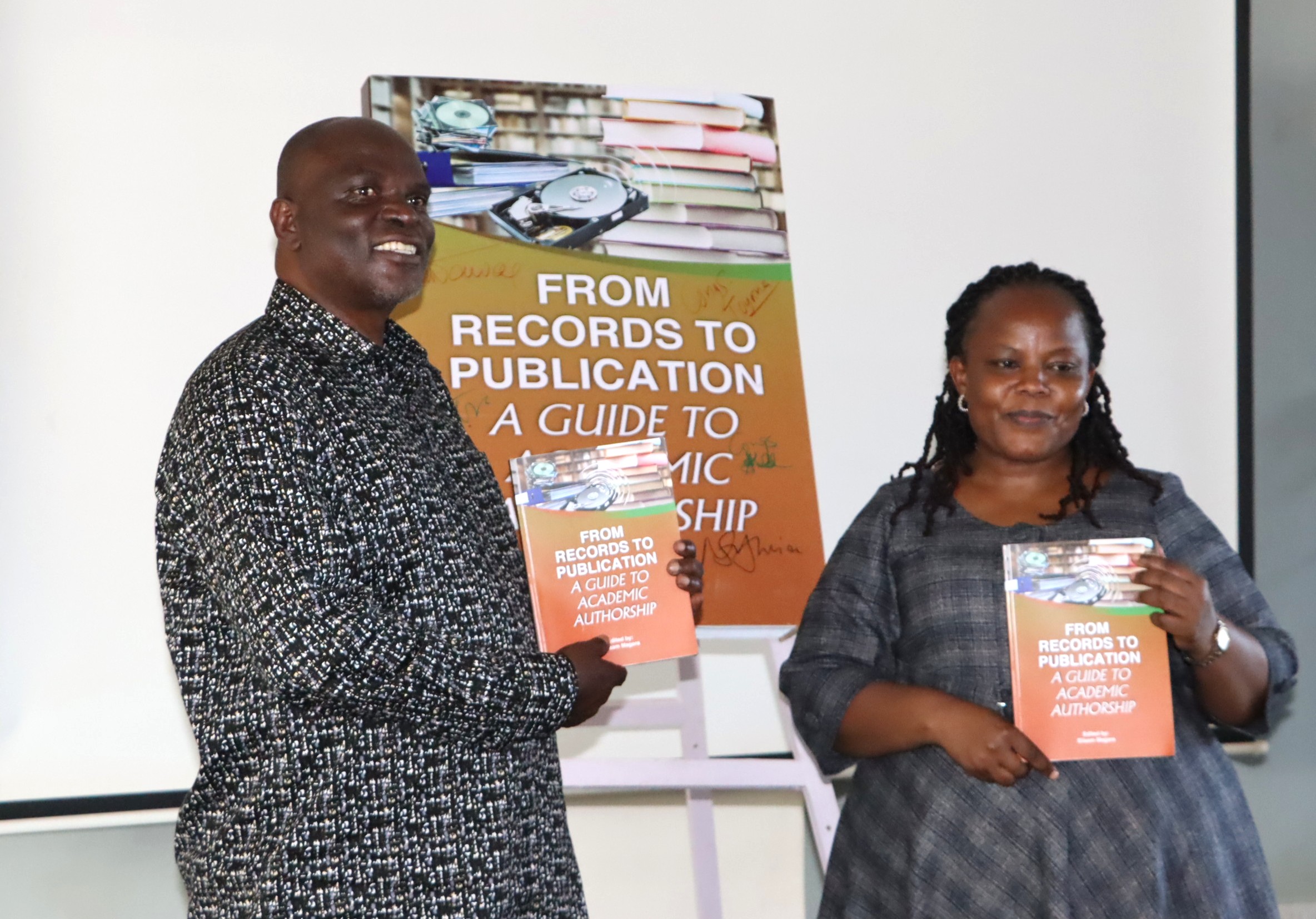
She concluded: “Well-managed records are not endpoints; they are the beginning of inquiry, reflection, and publication. This guide demonstrates that pathway.”
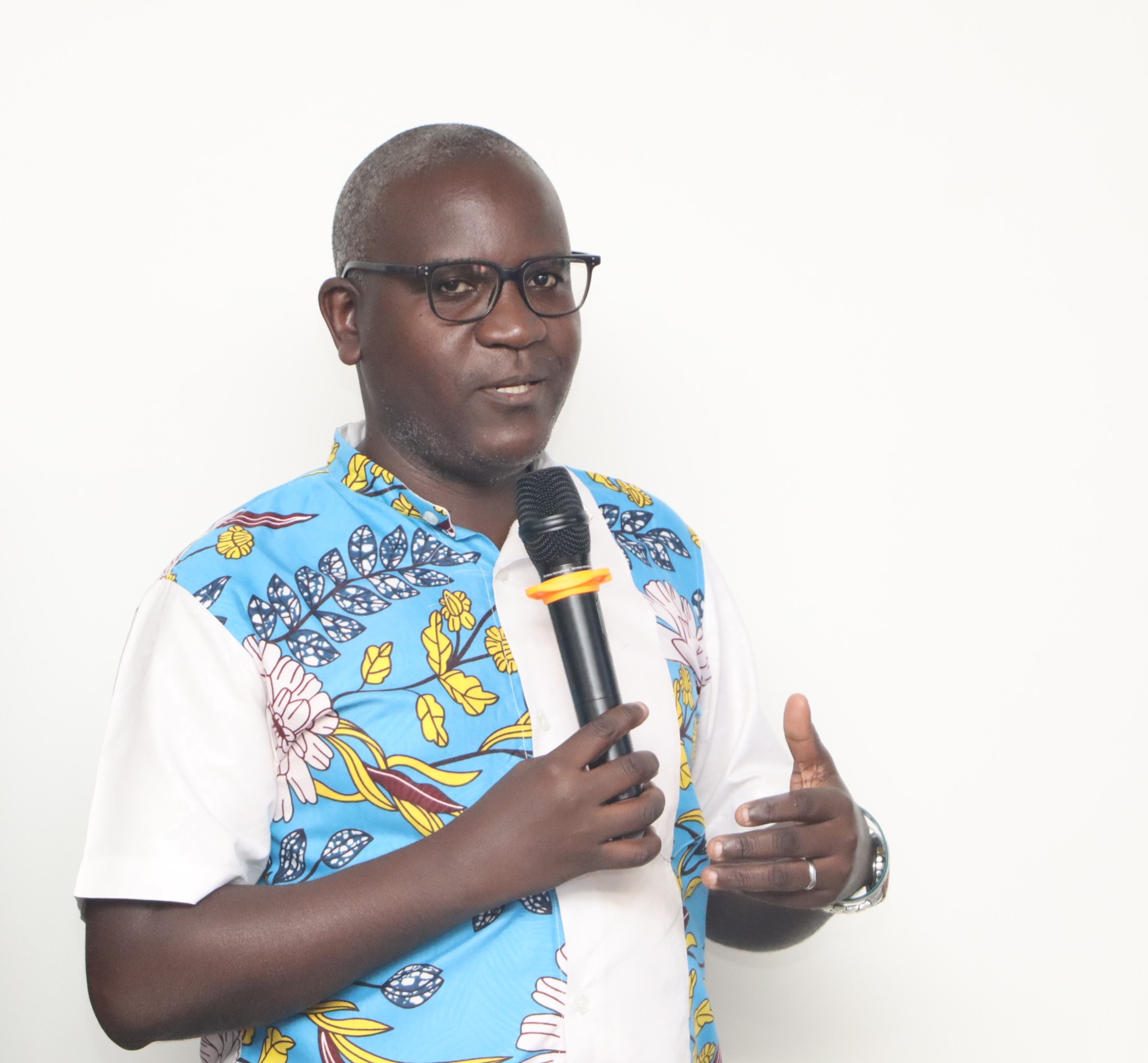
Book Outline
- Introduction: Publication Journey. (Prof. Elisam Magara)
PART I: Foundations of Academic Authorship.
- Conceptual Foundations of Academic Authorship
Elisam Magara and Joseph Kiplangat.
- Archives as a Source of Information for Academic Writing
David Luyombya, Sylivia Namujuzi and Francis Ekwaro
- The place of Oral History in Contemporary Writing
Elisam Magara, James Nkanshah-Obrempong and Nthan Nzyoka Joshua
- Managing Ethical Dilemmas in Academic Writing
Maria Tsvere, Tsitsi Kanonge and Joselin Chigwada
- The Role of Copyright and Neighbouring Rights in Protecting Works of Authors and Publishers in Uganda
Ronald Kakungulu Mayambala
PART II: Managing the Publication Process
- A Manuscript: From Inception to Publication
Sarah Mirembe Kyankya
- Managing Co-Authorship in Academic Writing
Gankhanani Moffat Moyo
- Managing Illustrations and Visual Artworks in Academic Writing
Bob Magara Rutatugirwa
- Tapping into Open Access Platforms for Gainful Authorship
George Muganga
- Managing the Costs in Academic Authorship
Aloysius Rukundo
- The Important Translation in Publication
Monica Mweseli
- Citations and Referencing in Academic Writing
Clement Lutaaya Nabutto, Namujuzi Sylivia, and Daviv Luyombya, Makerere University
- Referencing Management Software In Academic Writing
Odeke Moses Osamai and Constant Okello-Obura
- Compliance with International Bibliographic Control Standards in Academic Authorship
Elisam Magara and Dniel Osinde
PART III: Secondary Services in Academic Writing
- Journal Impact Factor and its Role when Submitting a Publication Article
Tonny J. Oyana and Caroline Ilako
- Managing Mentorship Programmes for Scholarly Writing
Diyoshak Rhoda Danladi and Elisam Magara
Report by
Jane Anyango, Principal Communication Officer CoCIS
Ritah Atukwatse, Journalism and Communication Student (2nd Year)
Fred Kanwagi, Journalism and Communication Student (3rd Year)
Computing & IS
CoCIS CIPSD Short Courses Jan-Mar 2026
Published
1 month agoon
January 19, 2026By
Mak Editor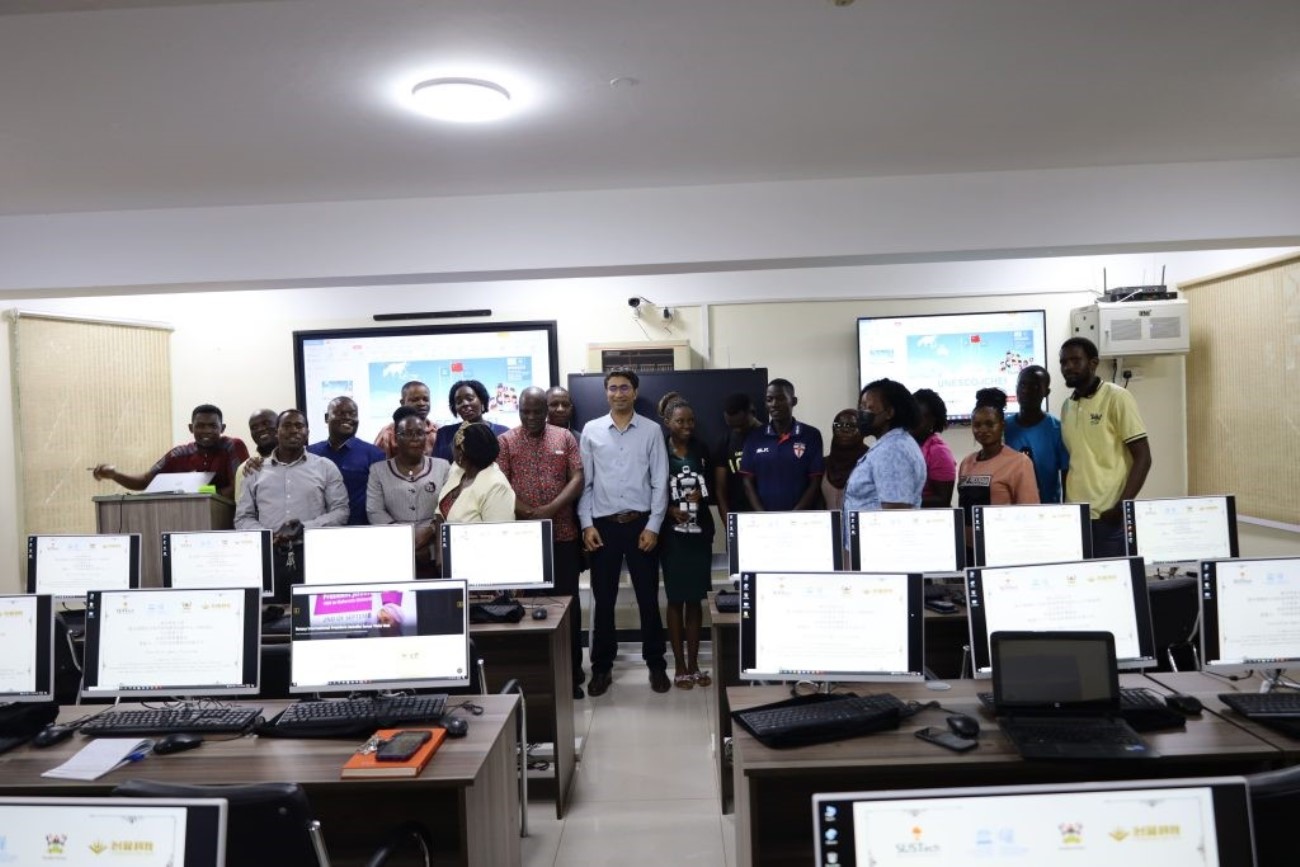
Makerere University College of Computing and Information Sciences (CoCIS) is the main ICT Training, Research and Consultancy Centre in Makerere University. The College has six Academic departments comprising of the Department of Computer Science, Department of Networks, Department of Information Technology, Department of Information Systems, Department of Library and Information Sciences, and the Department of Records and Archives management.
In addition to the mainstream degree programmes, CoCIS has a specialized Center for Innovations and Professional Skills Development (CIPSD) which delivers state-of-art training in ICT e.g. the Cisco Networking Academy for Cisco related courses, the Microsoft IT Academy Program for Microsoft related courses, International Computer Driving License course, Oracle Certified Training center for Oracle, Linux and Unix Training center. CIPSD also offers Machine Learning, Big Data Analytics, Data Science, Artificial Intelligence (AI) and Ethical Hacking as online courses. The College is an authorized Testing center, operating under PearsonVUE and Kryterion. Listed in the table (see download below) are the courses currently offered at the Center with their next start dates, duration, and cost.
- All courses are at affordable fees catering for Students, Vacists, Professionals and
- Anyone who wants to start a career in ICT or polish his/her ICT skills.
Contact Information
E-mail: psd.cis@mak.ac.ug
Tel: +256 782 512 897 +256 752 779964
URL: https://cocis.mak.ac.ug/cipsd/
Computing & IS
Makerere University and SoonPay Sign Landmark MoU to Champion Blockchain Innovation and Financial Inclusion Across Africa
Published
3 months agoon
December 9, 2025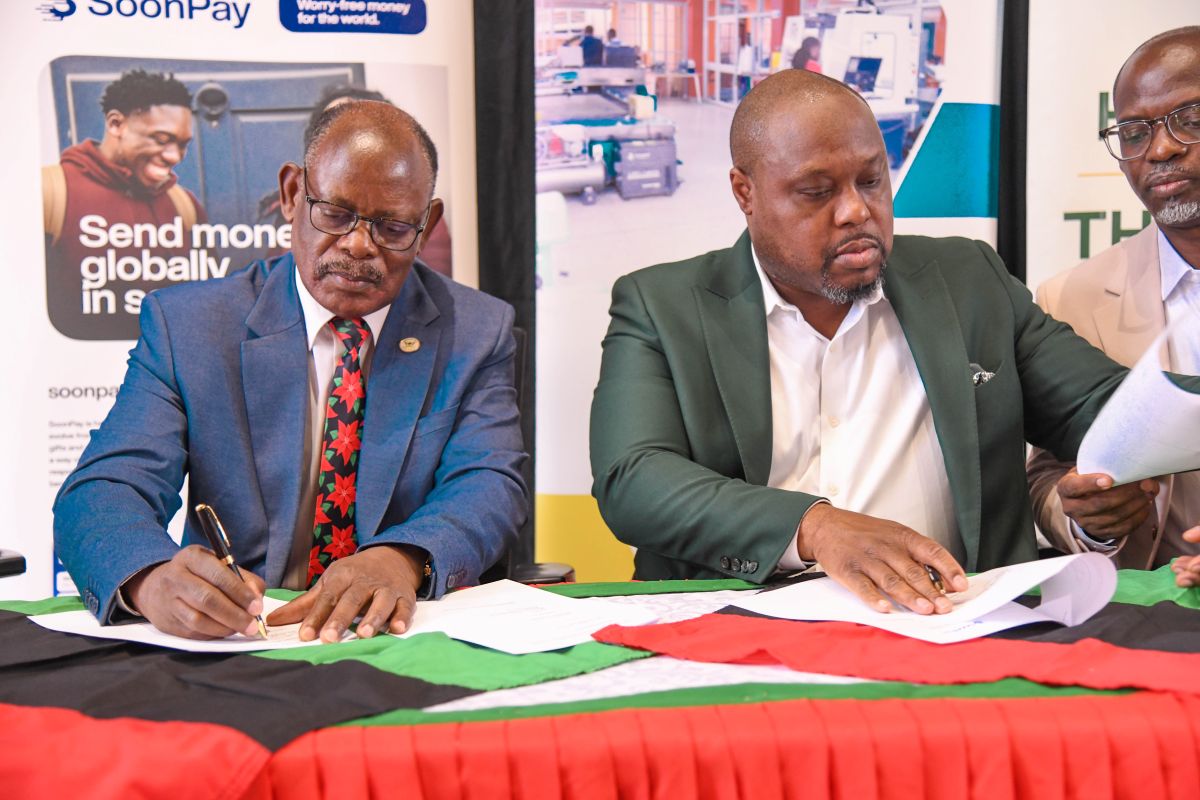
On Saturday 6th December 2025, Makerere University entered into a ground-breaking partnership with the U.S.-based fintech company SoonPay, marking a major breakthrough in Uganda’s push to integrate emerging technologies into research, innovations, higher education and national development.
The Memorandum of Understanding was signed by the Vice Chancellor of Makerere University, Prof. Barnabas Nawangwe and Mr. Frantz Morency, Chief Executive Officer of SoonPay L.L.C, during the Makerere University Financial Innovation Day, a high-energy event that brought together over 800 students, faculty, industry partners, and technology leaders.
The MoU institutionalizes the collaboration of Makerere University through the Makerere University Technology and Innovation Centre and SoonPay LLC. The signing ceremony was witnessed by Dr. Cathy Ikiror Mbidde-Manager of Makerere University Technology and Innovation Centre and Ms. Vuyani Jones-Blockchain Infrastructure Manager.
Organized by the Makerere University Technology and Innovation Centre (MUTIC) in partnership with SoonPay, the event ran under the theme “Innovation and Financial Inclusion for a Secure Future.” It featured keynote speeches, panel discussions, live demonstrations, and the signing of a Memorandum of Understanding (MoU) that will usher in a new era of blockchain training, research, and innovation at Uganda’s premier university.
The event was supported by several partners, including the National Social Security Fund (NSSF), the Uganda Blockchain Association, the National Planning Authority (NPA), Prudential Uganda, and other technology and financial sector stakeholders.
A Strategic Partnership to Transform Africa’s Digital Landscape
The newly signed MoU between Makerere University and SoonPay is expected to unlock a broad set of opportunities for students and academic staff. These include blockchain education and certification, joint research projects, internships and apprenticeships, the development of new financial inclusion tools, and the integration of emerging technologies into existing academic programs.
SoonPay’s entry into Uganda is part of a larger vision to expand blockchain-driven solutions across Africa—a continent its executives say has historically been excluded from global technological revolutions.

Impressed by the overwhelming numbers of students who filled the Yusuf Lule Central Teaching Facility Auditorium to the brim, the Vice Chancellor, said: “Dear students, by choosing to stay on campus, on a Saturday, and after completing your examinations, you have demonstrated your willingness to learn and embrace the blockchain technology as well as emerging technologies in general.”
Stating that blockchain technology is the future for Africa, the Vice Chancellor challenged the students to take charge of Africa’s digital transformation.
“You are the people to emancipate Africa from marginalization,” he declared. “What will liberate our continent is not politics—we have done too much of that. It is education, research, innovation, and technology.”
Prof. Nawangwe delivered a sweeping historical reflection, tracing Africa’s technological setbacks to the destruction of its civilization over several centuries.
“For 400 years, Africans were taken away as slaves. For another 200 years before that, our lands, knowledge systems, and technologies were disrupted,” he said. “This represents around 600 years of destruction and marginalization of African civilization.”
He urged students not to miss the opportunity that modern technologies such as blockchain and artificial intelligence present.
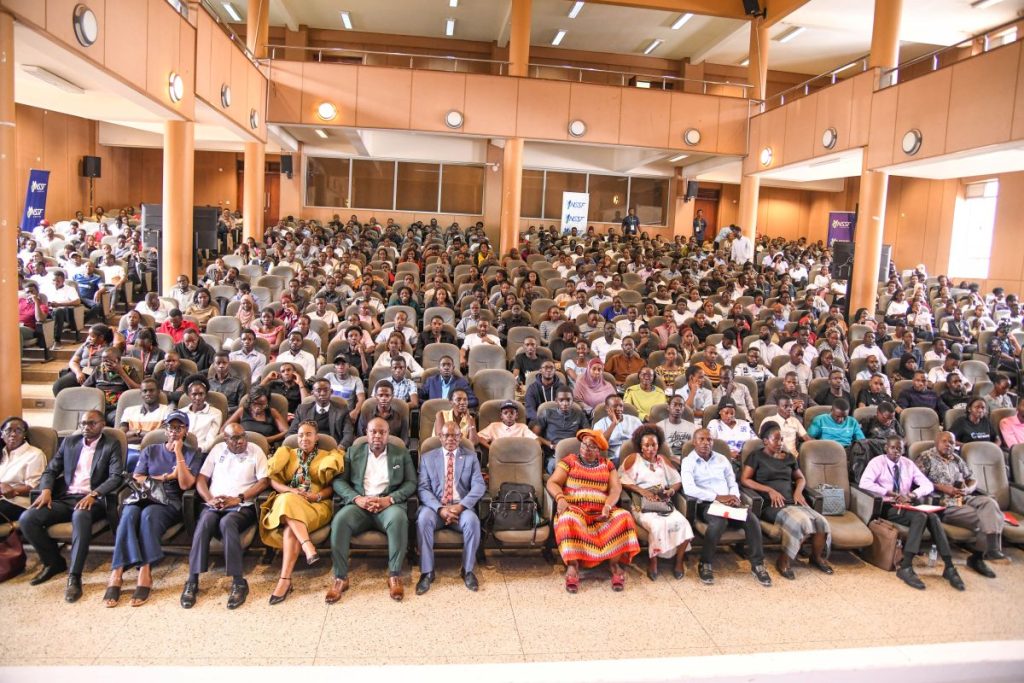
“We are lucky to be living in an era where Africa is free,” the Vice Chancellor said. “My hope is that we do not wait another 600 years to take advantage of this freedom. The most important resource we have is not minerals; it is human resources—you, the youth.”
Prof. Nawangwe reminded students that Makerere’s reputation as the “intellectual capital of Africa” places immense responsibility on their shoulders.
“You are among the very few Ugandans privileged to study at Makerere University. University graduates are not supposed to wait for jobs—you are the ones expected to create them,” he said.
Why Blockchain? Transparency, efficiency, and global competitiveness
The Vice Chancellor highlighted the transformative potential of blockchain technology, especially in improving financial systems—a sector he described as the backbone of any modern economy.
“Without efficient financial systems, nothing else works,” he said. “Blockchain offers transparency, reduces fraud, and minimizes corruption. If applied properly, it could transform how we manage finances, education, and even our natural resources, including the oil that Uganda is about to exploit.”
He added that Makerere’s students are already demonstrating global competitiveness in innovation, winning international competitions and creating products across multiple disciplines.
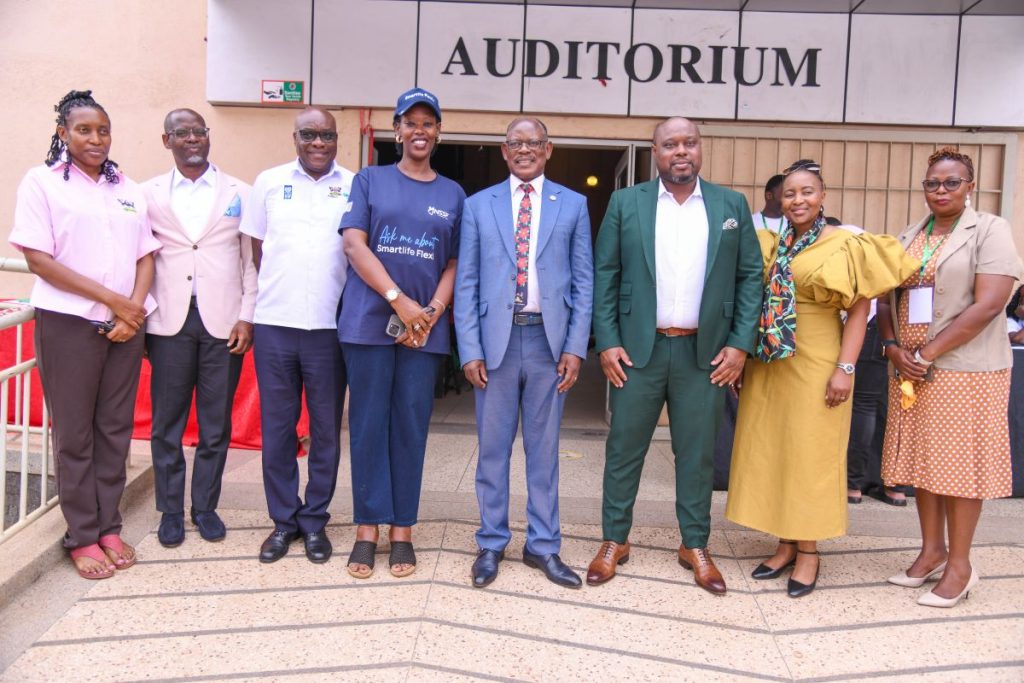
“The brains are here,” he said. “What we need is exposure to opportunities and technologies that will help you turn your ideas into impactful solutions.”
In a passionate keynote address, SoonPay CEO, Mr. Frantz Morency underscored why his company chose Uganda as its launchpad for blockchain adoption in Africa.
“As the Professor said, we have been excluded for more than 400 years,” he stated. “Even though we’re an American company, we know our roots. Look around the SoonPay team—you will see yourselves. We chose Uganda intentionally.”
Mr. Morency pointed to Africa’s dismal participation in the global blockchain economy. “In the U.S., blockchain generates $2.6 billion—61.7 percent of the world’s share. The rest of the world generates $1.6 billion. And Africa, just $14 million, or 0.33 percent,” he said. “That is unacceptable.”
He attributed the gap not to a lack of interest among young Africans, but to a lack of opportunity. “You want to learn—what you lacked was opportunity,” he said. “With the support of Professor Nawangwe, Dr. Cathy Ikiror Mbidde, and Dr. Margaret Nagwovuma, SoonPay wants to bridge that gap in education, technology, and economic opportunity.”
Mr. Morency also shared his personal journey, connecting his Haitian background to the aspirations of African youth.
“Many of you may see me as ‘the guy in the green suit,’ but I come from a small island—Haiti,” he said. “My mother never finished first grade; my father never finished second grade. What they gave me was integrity, work ethic, and the determination to seize opportunities when they came.”
He urged students not to seek opportunities abroad out of desperation, but to build meaningful careers in Africa. “Africa does not need to lose its talent. Why can’t you build here? Why can’t businesses, innovation, and prosperity thrive here?” he said. “Educate yourselves. Build. Create. Grow.”
A milestone for Makerere and Africa
Dr. Cathy Ikiror Mbidde, Head of the Makerere University Technology and Innovation Centre (MUTIC), described the event as a “major milestone” in the institution’s evolution.
“We are here to witness one of the key emerging technologies and to reflect on how universities can embrace such milestones,” she said. “Everyone has a role to play in transforming our lives through research, ideas, and projects.”
She thanked SoonPay for choosing Makerere University, noting that students had been “instrumental” in pushing for blockchain education.
“You have been constantly asking questions, pushing us, and showing deep curiosity about blockchain. Today, we finally have answers,” she told the students.
Beyond the speeches, the event showcased SoonPay’s blockchain infrastructure, student-led innovations, and a roadmap for integrating digital finance tools into university programs. Partners such as NSSF emphasized the importance of preparing young people for a digital future.
With the MoU now in force, Makerere University is positioning itself as a regional hub for blockchain education, research, and innovation. The partnership with SoonPay aims not only to train students but to shape Uganda’s—and Africa’s—next generation of tech leaders.
Trending
-

 Humanities & Social Sciences4 days ago
Humanities & Social Sciences4 days agoMeet Najjuka Whitney, The Girl Who Missed Law and Found Her Voice
-

 Health1 week ago
Health1 week agoUganda has until 2030 to end Open Defecation as Ntaro’s PhD Examines Kabale’s Progress
-

 Agriculture & Environment7 days ago
Agriculture & Environment7 days agoUganda Martyrs Namugongo Students Turn Organic Waste into Soap in an Innovative School Project on Sustainable Waste Management
-

 General1 week ago
General1 week agoMastercard Foundation Scholars embrace and honour their rich cultural diversity
-

 General3 days ago
General3 days ago76th Graduation Highlights
